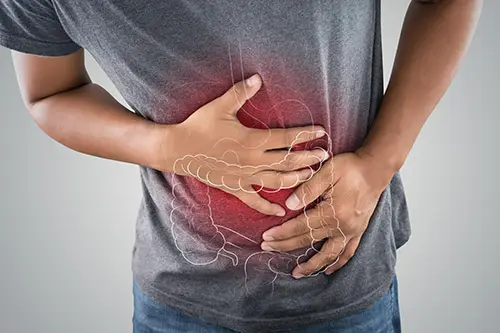Customise your IBS test
Add to your test
3 add-ons availableChoose how to collect your sample
4 optionsFinger-prick blood collection
Total price:
£199.00
Includes our
Essential IBS Test
Don't accept a diagnosis of IBS without checking for other important conditions that cause the same symptoms.
The IBS Test is a blood and stool test you take at home and send to our NHS-testing lab for analysis. We'll screen for key gut conditions commonly confused for IBS and you'll get a doctor's report explaining your results.
What you need to know about our Essential IBS Test
IBS or irritable bowel syndrome is very common but causes very similar symptoms to other gut conditions such as inflammation, coeliac disease, H. pylori and even bowel cancer. For example, a third of people with coeliac disease are initally misdiagnosed with IBS.
Guidelines recommend taking an IBS test before settling on a diagnosis of IBS to check for other common and important conditions that need treatment.
Stress and anxiety play a role in making IBS symptoms worse and sometimes the worry of not knowing what's causing gut symptoms feeds into this vicious circle.
Does the IBS Test check for IBS directly?
IBS is related to the gut-brain axis and isn't associated with any markers we can reliably measure with a stool or blood test. We actually diagnose IBS based on the symptoms and signs as well as ruling out other gut conditions with similar symptoms. This is where the IBS test comes in. We can't test for IBS directly but we can and should test for conditions causing similar symptoms such as gut inflammation, coeliac disease, H. pylori infection and even bowel cancer to rule them out.
If you've taken an IBS test to rule out these other conditions and have typical symptoms of IBS you can be more confident that you have IBS and are not missing anything else which should be treated.
What are the 4 symptoms of IBS?
The 4 main symptoms of IBS are:
- Stomach pain or discomfort
- Bloating
- Diarrhoea, or
- Constipation
Gut symptoms are often relieved by openning your bowels and made worse by eating. People with IBS also commonly experience non-gut symptoms including:
- Tiredness
- Nausea
- Headache
- Backache
- Bladder issues
Who should take the IBS test?
IBS is very common and affects about 1-in-5 and 1-in-10 people. Women are more commonly affected with IBS than men. IBS occurs in all ages but most people first get symptoms before the age of 35 and symptoms do seem to improve with age.
In about 10% of people with IBS, their IBS symptoms were triggered by an initial gut infection or gastroenteritis.
But whoever you are, and whatever the cause, before settling on a diagnosis of IBS guidelines recommend taking an IBS test to other important causes of gut symptoms that need treatment.
How the IBS test works

Do your IBS test
You'll get your kits next-working day.
Collect your blood and stool samples at home with the simple-to-use kest kits and post them back to our accredited lab for analysis.

Get results quickly
We'll return your results quickly along with a doctor's report explaining each result in clear, everyday language so you'll know what they mean for your gut health.

Get answers for your gut
Your report highlights whether another condition could be causing your gut symptoms or if IBS is more likely, with clear advice on what to do next.
If you need more support you can book a consultation with one of our gut specialists (costs extra).
What does the IBS Test check for?
The IBS Test includes both an IBS stool test and an IBS blood test. The IBS stool test checks for bowel inflammation and H. pylori infection. The IBS blood test checks for coeliac disease and general inflammation.
Gut Inflammation
Gut inflammation is a common cause of gut symptoms such as stomach pain and diarrhoea.
What's measured: (Click on a test for more info)
Coeliac Disease Risk
1-in-3 people with coeliac disease are misdiagnosed as having IBS before being correctly diagnosed with coeliac disease.
What's measured: (Click on a test for more info)
H. pylori Infection
Helicobacter pylori infection affects up to 1-in-5 of us in the UK. It causes stomach inflammation very similar symptoms to IBS.
What's measured: (Click on a test for more info)
Learn more about the IBS Test
Proton pump inhibitor (PPI) medication, such as lansoprazole or omeprazole can make the H. pylori stool test less accurate. If you take PPIs you should stop this at least 2 weeks before testing. It is usually safe to stop this medication for a short period of time, but if you're not sure, speak to your prescriber.
The test for coeliac disease will not be accurate if you do not have gluten in your diet. Make sure your diet contains wheat, barley or rye in the 6 weeks before testing for accurate results.
Gut symptoms can have a wide variety of causes but not every cause is relevant for every person. That's why we like to give you flexibility to choose the IBS test panel that's right for you.
If you're over the age of 40 and have gut symptoms that aren't settling down then guidelines recommend that you check for bowel cancer with a qFIT test.
If you've been travelling abroad or otherwise exposed to potentially contaminated food or water, then you may want to check for common bacterial and parasitic infections. We have two options you can add on. You can add on stool microscopy for ova, cysts and parasites to your IBS panel if you're worried about more exotic parasitic infections such as roundworm and flatworm. These are very unusual in the UK and nearly all cases come from exposure abroad.
Alternativly, you can also add on a combination PCR test for two common parasites - Giardia and Cryptosporidum - and 4 common bacterial infections - Shigella, Campylobacter, Salmonella and toxic E. coli. The bacteria tend to cause acute gastroenteritis where as infection with either of the two parasites can cause chronic symptoms which can easily be mistaken for IBS.
A number of common conditions like gut inflammation, coeliac disease and H. pylori infection can cause very similar symptoms to irritable bowel syndrome. This test panel checks for all these common conditions. If you get negative results, it's very unlikely that you have one of them. If we do pick one them up with a positive test, then you'll have a target to treat. Either way, you'll be in a better position to get your symptoms under control.
All the tests in the IBS panel are analysed by The Doctors Laboratory (TDL). TDL are one of the largest laboratories in the UK and test for the NHS (e.g. University College Hospital London) and private providers such as ourselves. Whether the test is for the NHS or a private healthcare provider, the exact same testing platforms and procedures are used.
But no test is perfect - there can always be "false positive" and "false negative" results. Each test in the IBS test panel has a different accuracy:
- Calprotectin test for inflammation: this is a quantitative test meaning that the result is a number. The number itself is accurate but a high calprotectin doesn't always mean there will be inflammation in the bowel. The value needs to be considered alongside other factors such as your medical history and any symptoms. Using a calprotectin cut-off value of 50µg/g, can exclude significant bowel inflammation with 99% certaintyref.
- H. pylori stool antigen test: 95.5% sensitivity and 98.6% specificityref. This means that about 4% of people with H. pylori can have a false negative result and about 1.4% of people without H. pylori can have a false postive result.
- qFIT test: using a limit of detection (4µg/g), the sensitivity of qFIT to pick up bowel cancer is 93.4% and the specificity is 77%. The "negative predictive value" (the liklihood that you don't have bowel cancer if you get a negative qFIT result) is approximately 99.9%ref.
- Coeliac disease test (tissue transglutaminase antibody test): 91% sensitivity and 91% specificity. The liklihood that you don't have coeliac disease if you get a negative test result is approximately 99.7%ref.
We do not recommend using the IBS test panel if you:
- are a child (17 years or under) - children can have different causes of bowel symptoms to adults and it's sensible to discuss these with your family doctor.
- are feeling acutely unwell - e.g. with a cold or flu - or if you have new-onset (i.e. within the last few days) gut symptoms such as stomach abdominal pain or diarrhoea.
If you're unsure if you should use this test panel, please contact us for advice.
Still have questions?
If you have any questions, we're here to help. Our customer service team is hands-down the best you'll ever deal with. They're smart, friendly, knowledgeable and will get back to you in a flash.
We've got the stats to back it all up.
When it comes to health, you want to know you’re in safe hands. We’ve got decades of experience, and we’ve got the stats to prove it.
20+
Years in healthcare
65,000+
5 star reviews

1 million+
Happy customers
2 million+

Our Privacy Promise
Your health is yours. It's personal. That's why we're committed to keeping your data safe and secure. Here's how we do it:
See our Privacy Policy and our Terms of Service for more info.








